How to Make an Audiobook: Detailed Step-by-step Guide for Beginners
This guide, perfect for beginners, shows you how to make your own audiobook, touching on everything from recording basics to the use of diverse tools and techniques. It provides a step-by-step approach to selecting the right recording equipment, optimizing your environment for clear sound capture, and utilizing software to edit and refine your audi
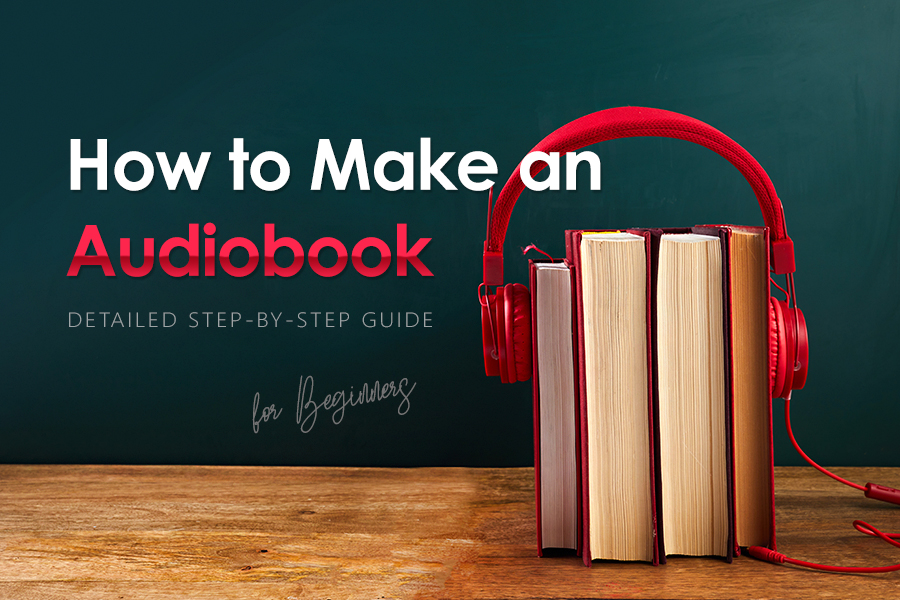
Listening an audiobook is like having a story whispered in your ear, full of life and emotion, anywhere and anytime. But have you ever thought about what it takes to turn a beloved book into an experience that can be heard? But it's not just reading aloud a book. It's about making the story jump off the page and straight into the listener's imagination. But what's the trick? A book has to sound great. Every word, every pause has to be just right to keep listeners hanging on every word.
The following guide is for anyone curious about transforming their written work into an audiobook. Whether you're a writer dreaming of giving your characters a voice or simply intrigued by the idea of creating something that can be listened to, read this guide and you'll find out the basics of recording, and how to get your audiobook out into the world. Let's break down the process into simple steps to make an audiobook that captivates and delights.
What is an Audiobook?
An audiobook is essentially a spoken version of a book, recorded and saved as a digital file. These digital files allow you to listen to any book. From classic literature to modern bestsellers, covering every genre imaginable. Whether you're into thrillers, science fiction, or prefer non-fiction titles like history or motivational guides, there's an audiobook out there for you.
While some books are exclusively published in audio format, most audiobooks are also available in print or as eBooks. The narration could be done by the authors themselves, professional voice actors, or even well-known celebrities, adding a unique flavor to the storytelling experience.

Typically, you would buy audiobooks through online platforms or apps dedicated to audiobook distribution, such as Audible. Some are available for purchase individually, while others can be accessed via subscription services, offering a library of titles for a monthly fee. After purchasing, you can download and store these audiobooks on various devices, including smartphones, tablets, or computers, making it convenient to enjoy stories on the go or in the comfort of your home.
Why Should You Make an Audiobook?
In an era where multitasking is more than just a skill, it's a lifestyle, audiobooks serve as the perfect companion for the busy reader. They allow people to enjoy literature while commuting, working out, or performing daily chores, effectively broadening your audience to include those who might not have the time or inclination to sit down with a physical book.
This flexibility has led to a significant surge in audiobook popularity, with the Audio Publishers Association reporting a 16% increase in sales in the US alone in 2020, reaching over $1.2 billion in revenue. This surge highlights the growing popularity and potential revenue opportunity for authors and creators in the audiobook space. So, an audiobook version of your story isn't just a nice-to-have - it's essential for reaching the widest audience possible.
How to Prepare Your Book for Recording
Getting your book ready for its audiobook debut requires some thoughtful preparation.
- Read Your Book Aloud: Before anything else, read your book out loud. This practice can help you identify any complex sentences, awkward phrasings, or tongue twisters that might challenge the narrator. Consider simplifying or rewriting these parts to ensure a smooth listening experience.
- Script Preparation: Transform your book into a script format suitable for audio recording. Highlight any emphasis needed on specific words or phrases and note the desired tone and pace for different sections. This goes beyond the text itself, including notes on tone, pace, and character voices, if applicable. Highlight any words that might need pronunciation guides, especially for names, places, or anything out of the ordinary. If your book contains dialogue, consider how each character's voice should sound and include guidance for the narrator.
- Technical Terms and Pronunciations: Make a list of any unusual words, technical jargon, or names in your book, and provide pronunciations for them. This step is especially important for fantasy or scientific works with unique terminology.
- Decide on Extra: Think about whether you want to include any additional audio elements in your audiobook, such as music or sound effects. These elements can enhance the listening experience but require careful planning to integrate effectively.
- Understand Audio Quality Requirements: Familiarize yourself with the technical standards for audiobook production, including audio quality, file formats, and other specifications your recording will need to meet. This knowledge will help you ensure that your final product is compatible with major audiobook platforms.
By carefully preparing your book for recording, you set the stage for an audiobook that captivates listeners from the first word to the last.
Choosing the Right Voice for Your Audiobook
After your book is polished and prepped for recording, deciding who will bring your words to life is the next critical step. You have a few options, each with its own set of benefits and considerations:
#1 Hire a Professional Narrator
Hiring a professional can elevate your audiobook with skilled storytelling and nuanced voice acting. Professional narrators know how to engage listeners, bringing characters and narratives to life with their experience and vocal range. Finding the right voice involves listening to samples or holding auditions to ensure the narrator fits your book's tone and style. While this option can add a level of professionalism to your audiobook, it's also the most costly. When considering this route, think about your budget and the potential return on investment.
The cost of hiring a professional narrator for an audiobook can vary widely based on several factors: the narrator's experience, the length of the book, and the complexity of the project. So, hiring a professional narrator can cost anywhere from $100 to $400 per finished hour for new or less established narrators, and from $200 to $500 or more for highly experienced narrators. For a standard-length novel (about 10 hours), this means the cost could range from $1,000 to $5,000 or more, depending on the factors mentioned earlier.
#2 Record by Yourself
Recording your own audiobook demands attention to several key aspects to ensure the final product is of high quality and meets industry standards. First and foremost, you should have a high-quality microphone and headphones, as well as a pop filter which can significantly enhance sound quality by mitigating plosive sounds. Also for your recording space you must find a quiet, well-insulated room for minimizing background noise and echo, which can detract from the clarity of your audiobook.
Don't forget about editing skills. You should know how to work with audio editing software to clean up your recordings by removing any mistakes, unwanted noises, or inconsistencies, thereby improving the overall quality of your audiobook. Additionally, it's important to ensure that your audiobook corresponds to the technical standards required by your chosen distribution platform. This includes making sure your audiobook conforms to specific guidelines regarding bit rate, noise floor, and other technical aspects.
#3 Use AI Voicing Tools
Opting for an AI voice generator when creating an audiobook presents a practical choice, particularly from a cost and efficiency perspective. Such technology sidesteps the expenses tied to professional narration and slashes the time typically required for recording and editing, offering a swift pathway from manuscript to finished audiobook. AI-generated voices maintain a consistent quality throughout the audiobook, avoiding the variances in tone or pacing that might occur with human-recorded content. The technology offers a wide selection of voices, accents, and languages, giving creators the flexibility to match the narration style closely with the content of their book or to employ diverse voices for different characters without coordinating multiple narrators.
Additionally, AI makes it easy to edit the audio, whether it's for minor pronunciation corrections or larger content updates, without the need to re-record sections. For authors looking for an accessible way to produce their audiobooks, especially those constrained by budget, time, or personal recording capabilities, AI voice generators present an appealing solution.
5 Best AI Voicing Tools
Each of these options has its own set of advantages and challenges. The choice depends on your book's specific needs, your budget, and how you envision your story being heard. Whether you opt for the warmth and depth of a professional narrator, the authenticity of your own voice, or the innovative touch of AI, ensuring the voice aligns with your vision is key to creating an audiobook that resonates with listeners. In this article, we will focus on the third option - using AI voicing tools.
Amazon Polly
Amazon Polly, part of Amazon Web Services, is a text-to-speech tool that's quite remarkable for turning text into spoken words that sound surprisingly human-like. It boasts an impressive range of over 60 voices across more than 29 languages. What really makes Polly interesting, though, is how it allows users to play around with the nuances of speech. You can adjust how fast or slow the speech goes, the pitch, and even the emphasis on certain words, giving you the ability to tailor the narration to fit the mood of your audiobook perfectly.
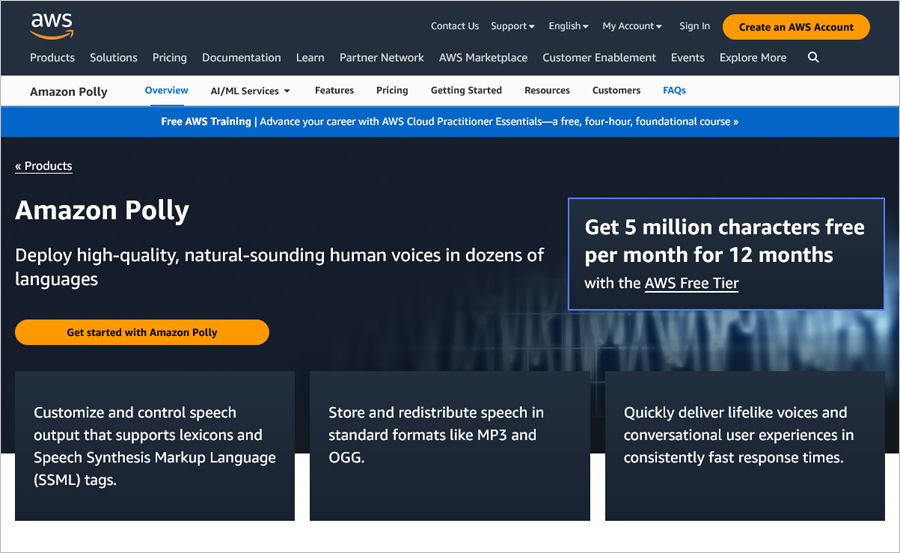
The support for Speech Synthesis Markup Language (SSML) is another handy feature. It's like having a secret code that lets you tweak the narration, adding pauses or changing the pronunciation of tricky words, ensuring that your audiobook sounds just right.
But Polly isn't just about the range of voices or the customization options. Its real strength lies in its foundation on AWS, meaning it's built to handle projects of any size. Whether you're working on a personal project or something more substantial, Polly is designed to scale with your needs.
While Polly offers real-time audio streaming and detailed control over speech output, it's not about pushing the service forward. Instead, it's about highlighting how these features can be useful for anyone looking to turn their written content into audible stories. With tools like Polly, the process of creating an audiobook becomes more accessible, allowing stories to be told in a new and engaging way.
Google Text-to-Speech
Google Text-to-Speech (TTS) converts words to sounds in the most human-like way possible by using their cutting-edge technology. Imagine having over 220 voices at your fingertips, in more than 40 languages, ready to tell your story exactly how you envision it. That's what Google TTS offers, making it easier than ever to create audiobooks that sound incredibly real and engaging.
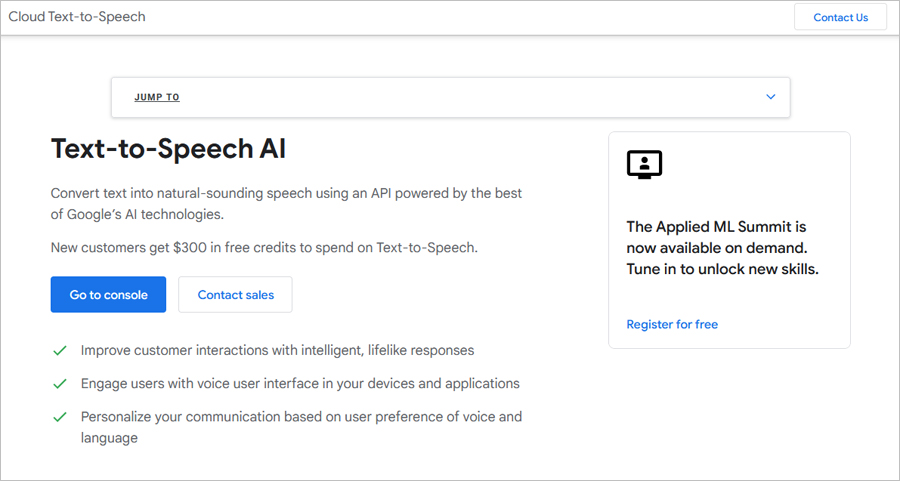
What really sets Google TTS apart is its use of WaveNet voices. This is a technology developed by Google's DeepMind. It's like giving your words a soul, with each sentence flowing more naturally, full of emotion and clarity. This isn't just a simple robotic voice reading text, it's more like a storytelling experience that can capture the essence of your narrative.
Google TTS doesn't just stop at amazing voices. It lets you play with the pitch, speed, and volume, giving you the control to match the mood of your audiobook perfectly. And with the power of Speech Synthesis Markup Language (SSML), you can fine-tune your audio to get the pauses, emphasis, and pronunciation just right.
Being part of Google's Cloud Platform, Google TTS is not only top-notch in quality but also scalable. Whether you're working on a short story or an epic novel, Google TTS can handle it with ease, ensuring your audiobook reaches your audience exactly as you intended. With Google TTS, your words aren't just read; they're truly heard.
Murf AI
Murf.ai feels like a game-changer for anyone looking to step into the audiobook scene. Imagine having a tool that offers you a choice from over 120 voices that speak in 20 different languages. That's Murf.ai for you—it's like a treasure chest for storytellers, packed with voices that can fit any character, mood, or story you're trying to tell.
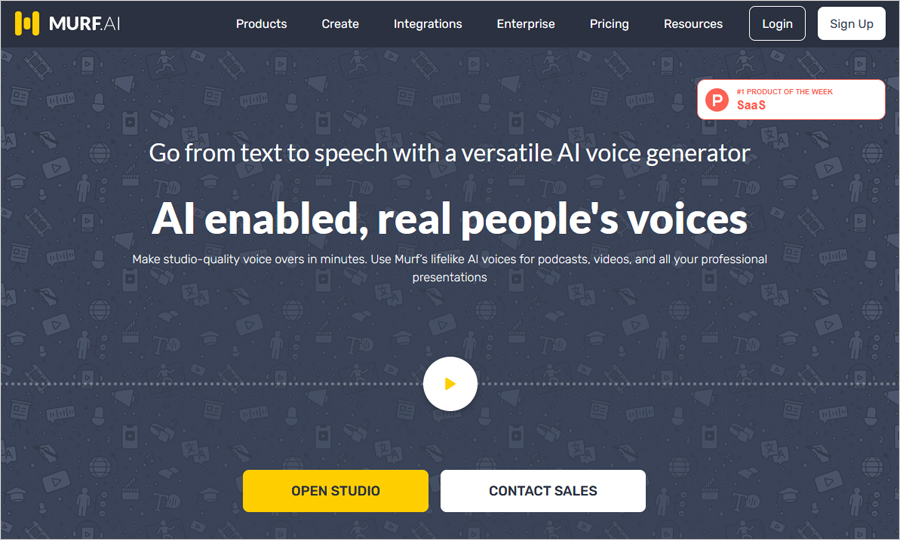
What really makes Murf.ai stand out is how easy it is to use. You don't need to be a tech wizard or have a recording studio. Whether you're a seasoned author or someone who's just jotting down their first story, Murf.ai welcomes you with open arms. It's all about picking the voice that feels right for your book, uploading your script, and then playing around with the delivery until it matches what you've imagined. Want to slow down the pace for a dramatic scene? Or maybe emphasize a word to let a joke land just right? Murf.ai has got you covered.
The beauty of Murf.ai lies in its ability to breathe life into words. The platform isn't just reading your story out loud - it's telling it. With voices that capture emotions and personalities, your characters jump off the page and speak directly to the listener's heart. This is what turns a simple listening session into a full-blown experience, making your audiobook something listeners can't put down, or rather, can't stop listening to.
And for those who might be wondering about the nitty-gritty - like audio formats and technical specs - Murf.ai keeps it simple. It plays nice with a variety of formats, ensuring your audiobook can travel far and wide, from the biggest online stores to the coziest little podcast apps.
Lovo
Lovo stands out in the AI voiceover market for its highly customizable and emotion-rich voice solutions. With a library exceeding 180 distinct voices across various languages and accents, Lovo caters to a broad spectrum of audio content creation needs. Its defining feature is the ability for users to craft custom voice skins, offering a level of personalization that's particularly appealing to brands and creators looking to establish a unique auditory identity.

Creators can navigate Lovo's platform with ease, thanks to its intuitive design. The process is streamlined: users input their text, select a desired voice, and Lovo's advanced AI takes over, ensuring the output is not just audibly pleasing but emotionally resonant with the intended audience. This capability to imbue AI-generated speech with a sense of emotion and personality is what makes Lovo a preferred choice for projects that demand a high engagement level, such as audiobooks, educational content, and interactive entertainment.
Lovo is continuously evolving, regularly enriching its voice library and integrating new functionalities to respond to the dynamic needs of its users. This commitment to innovation keeps it at the forefront of the AI voiceover technology field, offering a versatile and future-proof solution for content creators. Whether it's for capturing the nuances of character dialogue in an audiobook or ensuring an e-learning module speaks in a tone that enhances learning, Lovo provides a voice that can truly represent the heart of any content.
Synthesia
Synthesia is an innovative tool that transforms text into videos using animated characters, known as avatars, to narrate the content. This technology allows you to create videos by simply typing what you want the avatar to say. It can produce narration in over 60 languages, making it versatile for a global audience.
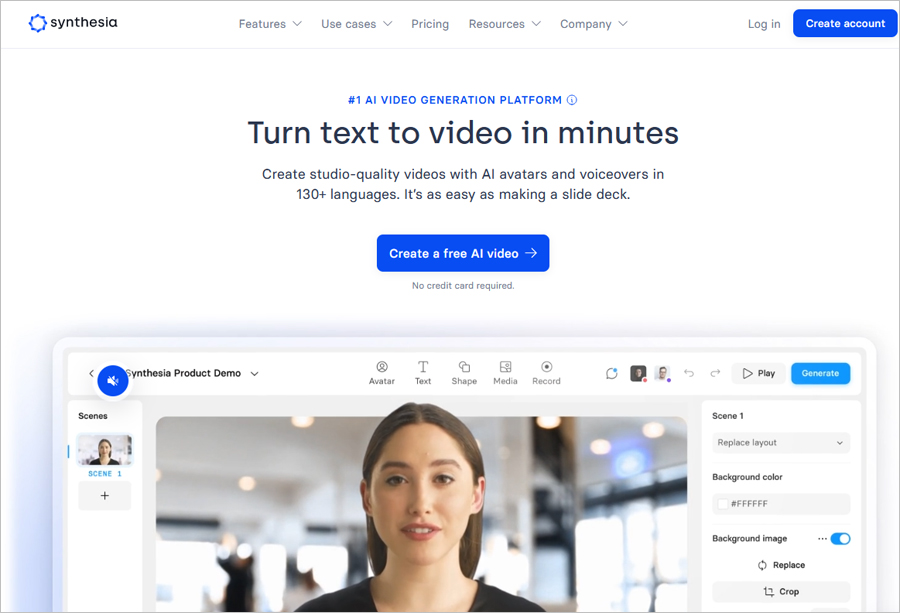
Using Synthesia is straightforward and does not require advanced technical skills or video editing knowledge. You choose an avatar, type in your script, and the platform generates a video where the avatar speaks your text as if it were a real person, complete with natural mouth movements and expressions.
This tool is especially useful for creating educational content, marketing videos, or training materials without the need for traditional filming equipment or actors. Synthesia's capability to make videos quickly and affordably is beneficial for individuals and businesses looking to communicate ideas or information effectively.
Synthesia continues to evolve, adding new avatars and improving its technology to enhance the user experience. It represents a step forward in content creation, offering a simple yet powerful solution for turning written information into engaging video content. Synthesia simplifies video production, making it accessible to a wider range of content creators who wish to leverage video for storytelling, education, or marketing.

Ahmad Yani
Ahmad Yani is an IT specialist and innovator from Bali, Indonesia. With a degree in Information Technology from Bina Nusantara University, Jakarta, he combines his deep knowledge of tech with a passion for cultural storytelling. Currently focused on sustainable IT solutions for remote areas. In his free time, he writes articles for popular technology and 'How-to' websites and communities.

Comments (3)
Write a comment. Your email address will not be published.
better read paper books
Reply to Dmitry
Thank you for your review. How well do these services vocalize? Will my audiobook, created with the AI voicing tools you described, sound as realistic as if I were to create it with my own voice? This is actually the most crucial aspect of creating an audiobook.
Reply to Chris Brown
If you had asked me this question five years ago, I would have said no. But over the last couple of years, significant advancements have been made in AI, and modern AI voicing tools can now produce audiobooks where the voice is indistinguishable from a real human's. Some of these tools even allow you to adjust the emotional tone of the reading - you can emphasize parts of a sentence or a specific word emotionally. And ultimately, it sounds exactly as a person typically would.. However, having created many audiobooks and tested numerous voicing tools, I must admit that I can sometimes distinguish an AI voice from a real human voice. The reason is the stress placement in words. AI sometimes misplaces stresses in some words, which can be noticeable to an audiobook listener.
Reply to Ahmad Yani